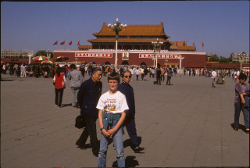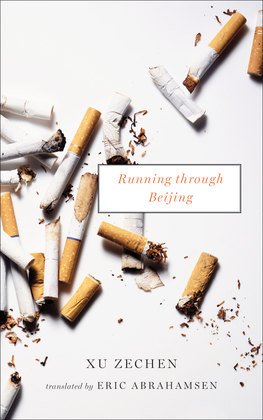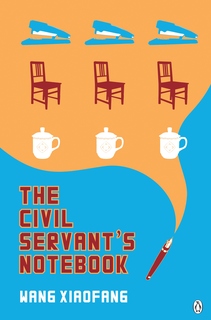Posts
By Eric Abrahamsen, November 10, '09
Julia Lovell very kindly consented to give us the following interview, on the occasion of the Penguin Classics' publication of her translation of the complete fiction of Lu Xun.
Edit: Great minds think alike, or at least ask their questions of the same folk – Danwei has also posted an interview with Julia.
Lu Xun occupies a transitionary literary period between the classical writing of imperial China and what we consider modern Chinese today. How did you go about choosing an appropriate voice and register in English? What were some of the resources you turned to?
I suppose that when I started I was trying to recreate Lu Xun's own frame of reference. As is well known, he was a voracious reader of foreign literature. He once advised young writers to "read no Chinese books. Or as few as you can. But read more foreign books"; he even advocated something called "hard translation" that imported foreign syntax into the Chinese language through translation. So I thought that an obvious place to start might be some of the (particularly Eastern European) writers that he was keen on, and whose impact on his writing some scholars have studied: Gogol's "Diary of a Madman", for example. My own academic background is also very much in May-Fourth period writing - so I found it helpful to draw on knowledge of that era and of its ideas about the literature it was trying to create. A big part of the May Fourth vision of a new, modern literature was that it should intervene in life, that it should have an edge of political urgency to it - and that's strongly there in a lot of Lu Xun's fiction and essays.
But finally, and at the risk of sounding lazy, I think that Lu Xun does a lot of a translator's work for him/her. There's a tightly controlled fury bound up in his best, most powerful stories (I'm thinking particularly of pieces such as "Medicine", "Tomorrow", "Kong Yiji") that simply asks to be recreated in the target language. (Though I'm not saying I've succeeded at that.)
More…
By Eric Abrahamsen, October 30, '09
There's plenty more to say about what went on at Frankfurt, but I said most of it in an article for the Abu Dhabi paper The National, which I will link to and leave it at that!
By Eric Abrahamsen, October 19, '09
Thursday night was China Literature Night, the largest gathering of Chinese writers during the fair. Mercifully, most officials had gone home at this point, and we enjoyed the rare treat of a major cultural event that did not begin with long-winded speeches by someone with a title. It was a thrilling sight for a Chinese literature fan: the front row of seats were occupied by Liu Zhenyun, Su Tong, Xu Zechen, Li Er, Ah-Lai , Yu Hua, Mo Yan, Tie Ning – I'm finding it difficult to avoid the words "power lineup". They jumped right into it. The first round was a conversation between Tie Ning and a German sinologist named Ulrich Kautz. I'm not too familiar with German sinologists, but he had snow-white hair, a Zhongshan suit, and a bit of an attitude – clearly a sinologist.
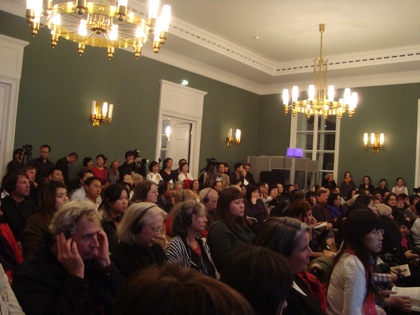
More…
By Eric Abrahamsen, October 19, '09
Here are a few images from the recently-concluded Frankfurt Book Fair, starting with the positive:
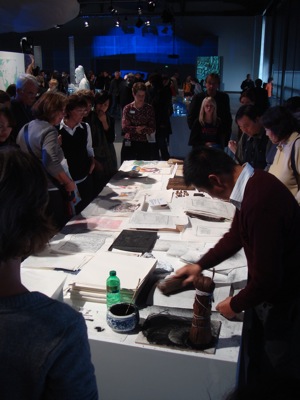
This is the main China Forum, where many of the big-ticket events took place. It was well designed, well-lit, interesting to look at, and while most of the displays featured the usual subjects ("trace the transmission of printing technology from China to your country!"), they were the usual subjects done well.
More…
By Eric Abrahamsen, September 8, '09
So that's over with. I have no hard figures or statistical summaries to offer, as I'm more of a "soft sciences" guy and spent most of the fair moderating/participating in/eavesdropping on various talks and conversations, so I'll just leave a few impressions here.
-
There wasn't an enormous foreign presence. Domestic and foreign exhibitors were in separate halls (except for the booth showcasing Spain, the Guest of Honor), and the foreign hall was decidedly sleepy. I had spoken with several foreign publishers who had threatened to come but didn't – by far the most common reason was money, and the fact that five weeks hence China will be the Guest of Honor at the Frankfurt Book Festival. Why come all the way to Beijing when you can get the best of China next month, whilst attending the world's biggest book fair? Can't say I can argue with this logic.
-
Despite this, the BIBF organizers made a special effort to bring international exhibitors together. This year was the second in which they held "Ten-plus-Ten" events, where ten Chinese publishing houses get together with ten publishers from one other country and get to know each other. There was even talk of a speed-dating format. I moderated the China-Spain Ten-plus-Ten, and it struck me as something worth pursuing. The two sides are generally so completely lacking in understanding of the other that it can be next to impossible to build relationships or even get a conversation going – this calls for a heavier hand. At first I felt a bit like a chaperone trying to organize a play date between reluctant participants, but things did warm up after a bit, and by the end there was plenty of swapping of name cards and catalogues. More of the same is called for.
-
There is a fierce curiosity here about what foreigners think of Chinese culture. The little talks I was running were mostly related to the translation of Chinese literature into foreign languages, and there were many, many questions about how Chinese writers are received abroad, and palpable anxiety about why they're not more popular. It was suggested by one audience member that foreign readers who couldn't tell their Wang Meng from their Wang Shuo could be asked to read a short overview of Chinese literature in advance. There were some seriously crestfallen faces in the crowd when Cindy clarified that the three percent problem wasn't that Chinese literature made up a mere three percent of books published in the US, but that literature from all countries around the world had to share that measly percentage among them. I had difficulty handling such questions as "Do you think the anti-corruption genre of Chinese literature would be popular abroad?" and "Do foreign readers only want to read about the Cultural Revolution?" and "I wrote a new version of the Daodejing, do you want to translate it for me?" All in all it was nice to be able to talk about these issues in front of a large crowd. People seemed interested when Barbara Wang (a German translator of children's literature) said that the overbearing didacticism of Chinese children's literature went over like a lead balloon in Germany, and the guy who asked why China hasn't won a Nobel Prize in literature seemed genuinely thoughtful when I said that for one thing, it has, and besides, they give the prize to a writer, not a country.
Good times all around!
By Eric Abrahamsen, September 4, '09
A good spot for new on the Fair while it's going on is Publishing Perspectives, which will continue to provide reports over the next few days; I'm not aware of any other English language press with local coverage…
By Eric Abrahamsen, September 3, '09
This nudge from Bruce is timely – the Beijing Book Fair is indeed going on over the weekend, we are indeed attending, and even hosting some events.
The events we think you'll enjoy the most (ie, the ones we're involved in) are four small talks on topics related to translation. The schedule is as follows:
-
Saturday, Sep 5
3pm The translation process: the changing roles of author, translator, agents and publishers.
-
Sunday, Sep 6
10am Translating culture: When is simply translating language not enough, and is the translator justified in "helping" his/her readers to understand unfamiliar cultural content?
3pm Foreign perceptions of Chinese literature, and how that affects what books get translated/published, and how they're received.
-
Monday, Sep 7
10am Translation of foreign literature inside China: Quantity vs quality.
Tickets to get into the fair are 20 RMB. You're all welcome to come and heckle; the events are taking place in Building 8 of the International Exhibition Center (the building where the foreign publishers are located), in the section reserved for countries to display their literary promotion programs. We're right next to the coffee.
By Eric Abrahamsen, August 26, '09
Yesterday the Guardian posted the obituary of David Hawkes, translator and scholar, and one of the giants of Chinese literary studies. His translations of the Songs of Chu and the first 53 chapters of the Story of the Stone are definitive, and beautiful, but more than that he was an influential guide and teacher for many of the great Sinologists and translators of the past fifty years. He passed away July 31 in Oxford, aged 86.
John Gittings' obituary contains more detail and personal insight than we, who belong to a different generation, could hope to provide, but I did have the pleasure and honor of meeting Hawkes briefly this past spring, while passing through Oxford. He and his wife Jean were thoroughly gracious hosts; they fed us, showed us pictures of their lives in China at the dawn of the PRC, and talked to us about Chinese literature and translation for the few brief hours we were able to stay. My overwhelming impression of Hawkes was of a translator sustained and nourished by his love of literature, whose humility was touchingly complete, who had reached a point in life where he took everything lightly, particularly those things that brought him joy. When it came time for us to leave he took up his hat and cane to see us off at the bus station, and stood there waving until we had moved out of sight.
I think we're planning a small memorial gathering in Beijing for this Friday (August 28), anyone who's in town and wants to attend please email me.
By Eric Abrahamsen, July 30, '09
Yesterday's big news was the announcement of the republication of Ruined Capital by Jia Pingwa, one of the major novelistic works of the past few decades, and a perpetual lightning rod for controversy and criticism. The Writers Publishing House is doing the honors.
The book has for some years been under something like a soft ban: no new editions have come out for a while, and it was getting harder and harder to find a non-pirated version of the book. The 'controversy', based almost solely on the fact that there's sex in the book, was pretty silly from the beginning: it was an awfully prurient read when it came out in 1993, but the constitution of the modern Chinese reading public is highly fortified compared to what it used to be, and it's hard to imagine anyone really raising an eyebrow at the steamy scenes today.
More…
By Eric Abrahamsen, June 30, '09
Following this previous link to an interview with Mo Yan in French, Igor Yegorov wrote in with an English translation so we didn't all have to suffer through the Google translator. Thanks Igor!
Writer Mo Yan : From dictatorship of the Party to that of the market
By Bertrand Mialaret | 24/06/2009 | 12H57
The Chinese writer Mo Yan is spending a week in France to talk about his books and his new novel, due to be published in late August. The meeting with him in Beijing was facilitated for Rue89 by Bertrand Mialaret, chronicler of Chinese literature, and Pierre Haski. The exchange was rendered possible by Chantal Chen Andro, translator of several books by Mo Yan.
More…
By Eric Abrahamsen, May 31, '09
Foreign publishers considering attending the 2009 Beijing International Book Fair might want to know about the Special Publisher Program, aimed at publishers who want to attend the fair but are a little tight on funds. The application deadline for this program has been extended to the end of July, so if you're interested click here for more details and application instructions.
By Eric Abrahamsen, May 11, '09
St. Jerome may be the patron saint of all translators, but for those of us working in Chinese literature, David Hawkes is something like a living buddha. His work on the first 80 chapters of The Story of the Stone would be enough, but there's also Songs of the South (translations of Qu Yuan and other 楚辞), and A Little Primer of Tu Fu, an authoritative introduction to the Tang dynasty poet Du Fu.
Hawkes, now long retired, lives in Oxford, and when we were in London recently, we made a special trip up to the original college town (absolutely beautiful) to pay him a visit. He and his wife graciously received us, and fed us, and we had two short hours to talk about China and Chinese literature. We exchanged reminiscences about Beijing – apparently we have lived in spots only a few blocks apart – which I later had to re-evaluate when I realized that the last time he was in Beijing it still had its city walls, and he arrived there by steamship.
More…
By Eric Abrahamsen, May 11, '09
The following is a translation of this article from Caijing magazine, entitled 译书有禁区 (Book Translation's 'Forbidden Area' in China).
Here's a comment left by a netizen on this writer's blog post, 'Huiyuan is a Foreign Enterprise':
"Is there a Chinese language version of Capitalism with Chinese Characteristics? Can you buy it on the Mainland?"
My blog post described a few ideas from a new book by Professor Huang Yasheng, at MIT's Sloan School of Management (Yasheng Huang, Capitalism with Chinese Characteristics: Entrepreneurship and the State, Cambridge University Press, 2008).
Professor Huang is an overseas-Chinese scholar, and his book is written in English. But I must agree with the commenter's point: there's little chance that a Chinese translation of the book could be published.
In fact, very few books published abroad by overseas-Chinese scholars are translated into Chinese, particularly when the books are written on the subject of China. Some scholarly works are translated into Chinese, but with some of the contents altered. Of course, works by non overseas-Chinese also meet with the same treatment.
I'll give a few other examples of which I'm aware:
In 2005, Hu Danian, professor of history at the City University of New York, published China and Albert Einstein through the Harvard University Press (China and Albert Einstein: The Reception of the Physicist and His Theory in China, 1917-1979, Harvard University Press, 2005). One year later, Professor Hu translated his own book into Chinese as 爱因斯坦在中国 (1917-1979), adding quite a bit of newly-discovered historical material, and it was published by the Shanghai Science and Technology Education Publishing House, part of the Shanghai Century Publishing Group.
The part of the book describing criticisms of Einstein and his theories during the Cultural Revolution was deleted, and the names of several famous people, including famous scientists, were removed. Interested readers can compare the published versions with some chapters available online:
http://www.tecn.cn/data/18249.html
The Chinese Century: The Rising Chinese Economy and Its Impact on the Global Economy, the Balance of Power, and Your Job (Wharton School Publishing, 2004), by Professor Oded Shenkar, Ohio State University's School of Business, was published in Chinese in 2005 by the People's University Press. But the chapters on intellectual property rights were deleted altogether, because the translator did not agree with the writer's point of view.
More…
By Eric Abrahamsen, May 3, '09
20,000 RMB for 34,000 WORDS (but lots of repetition, conversations mostly). Subject: three smart, funny modern women in contemporary Beijing. If you can finish the first draft by MAY 11th, there's a 5,000 RMB bonus.
Payment upon completion of final subs. Minimal interface with director required – maybe none at all.
Chris Barden is project managing this and will proof the final titles.
Contact directly: chris@hutongrobot.com
13911163683
By Eric Abrahamsen, April 22, '09
Announcements have been made for the 2009 PEN Translation Grants, though the press release has not yet appeared online, we'll link to it when it does. The only Chinese-language grant went to my translation of Wang Xiaobo's collection of essays, My Spiritual Homeland. You can download a PDF translation of "The Silent Majority", one of the essays from this collection, by clicking here. This essay was originally published in the Asia Literary Review.


